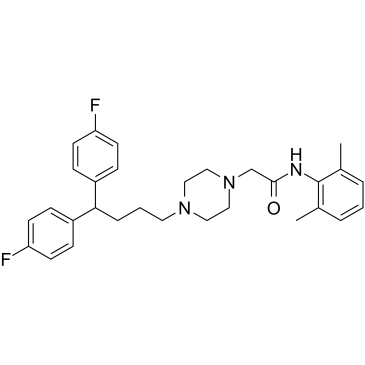Effects of lidoflazine on left ventricular function in patients.
S G De Hert, I E Rodrigus, L R Haenen, P W Ten Broecke, C J Boeckxstaens, T C Gillebert
文献索引:J. Cardiothorac. Vasc. Anesth. 11(1) , 42-8, (1997)
全文:HTML全文
摘要
The present study evaluated the effects of the nucleoside transport inhibitor, lidoflazine, at a dose of 1 mg/kg, on left ventricular function.Patients were randomly assigned to receive either lidoflazine or saline in a double-blind manner.A university hospital.The study was performed in 32 patients scheduled for elective coronary artery bypass surgery.Left ventricular pressures were measured with fluid-filled catheters. Data were digitally recorded during pressure elevation induced by tilt-up of the legs. Transgastric short-axis echocardiographic views of the left ventricle were simultaneously recorded on videotape. Systolic function was evaluated with the slope (Ees, mmHg/mL) of the systolic pressure-volume relationship. Diastolic function was evaluated with the chamber stiffness constant (Kc, mmHg/mL) of the diastolic pressure-volume relationship. Cardiac function was assessed at baseline and after administration of either lidoflazine (group A [n = 16]) or placebo (group B [n = 16]). Data were compared using two-factor analysis of variance.At baseline, diastolic and systolic function were comparable in both groups. Lidoflazine increased Kc from 0.079 +/- 0.015 to 0.125 +/- 0.017 mmHg/mL and decreased Ees from 2.481 +/- 0.213 to 1.217 +/- 0.211 mmHg/mL (p = 0.009 and p = 0.004, respectively). None of these changes occurred when placebo was administered.Administration of lidoflazine before the start of cardiopulmonary bypass impaired left ventricular systolic function but also increased diastolic stiffness.
相关化合物
| 结构式 | 名称/CAS号 | 分子式 | 全部文献 |
|---|---|---|---|
 |
利多氟嗪
CAS:3416-26-0 |
C30H35F2N3O |
|
Protective effects of the lazaroid U74500A and lidoflazine o...
1993-01-01 [Transpl. Int. 6(5) , 281-4, (1993)] |
|
Simpson's paradox and clinical trials: what you find is not ...
1992-12-01 [Ann. Emerg. Med. 21(12) , 1480-2, (1992)] |
|
1,4-Dihydropyridines bearing a pharmacophoric fragment of li...
1996-10-01 [Bioorg. Med. Chem. 4(10) , 1629-35, (1996)] |
|
The pathophysiology of angina pectoris and the effect of lid...
1982-01-01 [Circulation 65(1 Pt 2) , I27-32, (1982)] |
|
Lidoflazine and myocardial protection.
1995-05-01 [J. Thorac. Cardiovasc. Surg. 109(5) , 1013-4; discussion 1015, (1995)] |